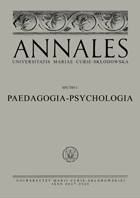Samoocena a gotowość do zachowań asertywnych wychowanków instytucjonalnej pieczy zastępczej
Self-Assessment and Readiness for Assertive Behavior among Children in Institutional Foster Care
Author(s): KONRAD KAWALASubject(s): Psychology of Self, Family and social welfare
Published by: Wydawnictwo Naukowe Uniwersytetu Marii Curie-Sklodowskiej
Keywords: self-esteem; assertiveness; alumni; foster care; social skills;
Summary/Abstract: The aim of the article is to determine the relationship between the self-esteem of alumni of institutional foster care and their readiness for assertive behavior. Alumni of these institutions usually spend several years there; they end this stage of their lives with different experiences and personal resources. Their life, both now and in the future, will depend on how they have been prepared to cope with life, and what personal qualities and social skills have been developed in them. Self-esteem is an important feature of a person, which largely determines his functioning, activities undertaken, life goals, and social relations. It is a feature on which a person’s assessment of the current situation depends, as well as his vision of his own future. Among the key social skills is assertiveness, which enables a person to function in harmony with oneself, achieve personal goals, and protect one’s own rights while respecting the respect and rights of others. In the case of alumni of institutional foster care, there are many indications that the family environment, peer group or comparing oneself with others can adversely affect their self-esteem, the formation of aggressive or submissive behavior.
Journal: Annales Universitatis Mariae Curie-Skłodowska. Sectio J. Paedagogia-Psychologia
- Issue Year: 36/2023
- Issue No: 1
- Page Range: 93-108
- Page Count: 16
- Language: Polish

